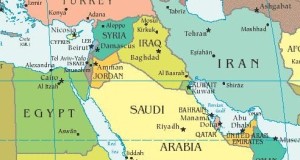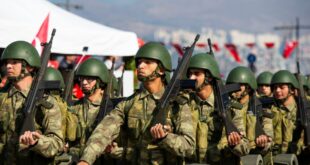There are already timid signs that the regional tension in the Middle East may have already passed its peak. The fact that Syria’s ceasefire is still holding, at least in some areas, is definitely one of them. Another is the recent visit of Turkey’s Prime Minister Ahmet Davutoglu March 4. Diplomatically, it was the turn of Tehran to make up for the visit of its foreign minister, Jawad Zarif, who cancelled his visit to Ankara at the last minute in August.
According to Iran’s TV, Syria was on the agenda of Davutoglu-Zarif talks. Iraq was discussed as well. The difference between the two dossiers is obvious. While the Syrian crisis has not reached any pause yet, Iraq’s problems are more or less clear to all eyes.
Davutoglu took with him to Tehran his ministers of economy, trade, energy, transport, communications and development. This explains that the real focus of the Prime Minister was to rebuild the bridges with an Iran getting ready to enter the global market in the post-sanctions era. Political hot-headed speeches can step aside for a moment when Turkey finds its potentially dynamic neighbor planning its way forward.
And Davutoglu heard it out loud in Tehran: It will not be for free. Iran’s President Hassan Rouhani had this to say while receiving the Turkish Prime Minister: “Iran and Turkey have common objectives and interests and must strengthen the foundations for peace and stability in the region through improving bilateral cooperation and focusing on the fight against terrorism as a common enemy”.
What Rouhani was in fact saying is that it all depends on Ankara’s regional behavior.
Davutoglu responded in kind. ““Behind closed sessions, we have already discussed upgrading the level of bilateral ties in order to boost cooperation in energy, banking, transport and tourism. By upgrading our ties, we can also sit for talks and resolve our political differences in the region”.
What the Prime Minister was in fact saying is that economic ties come first, then we can talk about political differences.
Further determination of the kind of price Tehran expects came from Zarif. Iran’s foreign minister hinted at Ankara’s regional ties in a way that directly pointed to the need, in Tehran’s view, to change their orientation. “Some countries in our region, particularly the Saudi government, have pursued wrong policies, seeking to create tensions and insecurity in the entire region”, Zarif bluntly said after his meeting with Turkish PM.
It was clear after Davutoglu bold visit that actually he achieved very little results, if any. Just following the departure of the Prime Minister, Tehran’s deputy foreign minister Amir Abdullahian briefed the Parliament National Security and Foreign Policy Committee by saying that “it is obvious that Ankara’s Syria’s policy has failed”. “Yet, Turkey failed to overthrow Syrian President Bashar Al Assad despite support by Saudi Arabia, Qatar and the US”, he added.
The visit should not, however, be declared a total failure. It helps crystalize an illicit pressure on Ankara to review its regional policies. Although no direct consequences, in the form of announced changes in policies, should be expected, Turkey would see the potential fruits of such a review in clearer terms. Tehran hopes that this will grow gradually into a change in Turkey’s regional positions at one point down the road.
Yet, such a reorientation in Ankara’s policies is difficult to envisage in the foreseeable future. There is a genuine ideological dimension in Ankara’s motivations. Furthermore, Turkey’s President Recep Tayyip Erdogan still believes that his Middle East policies have not failed totally yet. He is willing to adapt his approaches, as seen in his successful not-very-secret talks recently held with Israel, but he does not see any pressing need to change those approaches altogether. And, practically speaking, he might not be able to make a full U-Turn even if he sees the benefits.
The prospects of a potential change may worry the Saudis. So far, they are progressing in effecting Egypt’s positions, albeit too slowly to fit their perceived pressing regional coalition. A Turkish-Saudi-Egyptian alliance would indeed play a central role in shaping the Middle East. And Tehran is trying to show the Turks some promised goodies to inch them out of the Saudi orbit. They may extend some help to Cairo as well. Iraq’s PM Haider Abadi was in Cairo recently in an official visit. He might have been carrying in one of his pockets a message about regional policies along the lines of Mr. Zarif’s views of that matter.
One way to move forward for Turkey is to start with an easier problem like the one in Iraq. Although Ankara has limited cards there, it still has some. It receives Kurdistan oil and can work on a solution for the budget dispute between Erbil and Baghdad in coordination with Tehran. It can also pave the road for an understanding between the Arabs and the Iranians in Iraq. There are many ways, out of the box, to be able to play a constructive role without threatening its allies in the Arab side all the while creating a dialogue with the Iranians.
True that Syria poisons all the horizons, but the Syrian crisis will not remain forever. This crisis showed that it is easy to go to war, but it is difficult to end it or to achieve a zero-sum “absolute” victory. The road in the middle is there wide open, even for Ankara’s Tehran and regional policies.
 Geostrategic Media Political Commentary, Analysis, Security, Defense
Geostrategic Media Political Commentary, Analysis, Security, Defense





